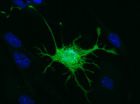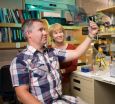(Press-News.org) CHICAGO --- African-American and European-American men at high risk of prostate cancer have greater odds of being diagnosed with an aggressive form of the disease if they have a vitamin D deficiency, according to a new study from Northwestern Medicine® and the University of Illinois at Chicago (UIC).
Results of the study will be published May 1 in Clinical Cancer Research, a journal of the American Association for Cancer Research.
"Vitamin D deficiency could be a biomarker of advanced prostate tumor progression in large segments of the general population," said Adam B. Murphy, M.D., lead author of the study. "More research is needed, but it would be wise for men to be screened for vitamin D deficiency and treated."
Murphy is an assistant professor in urology at Northwestern University Feinberg School of Medicine, a physician at Jesse Brown VA Medical Center and a member of the Robert H. Lurie Comprehensive Cancer Center of Northwestern University.
"This is the first study to look at vitamin D deficiency and biopsy outcomes in men at high risk of prostate cancer," said Rick Kittles, senior author of the study. "Previous studies focused on vitamin D levels in men either with or without prostate cancer."
Kittles is an associate professor in the department of medicine at UIC.
Scientists examined data collected from a diverse group of more than 600 men from the Chicago area who had elevated PSA levels or other risk factors for prostate cancer. Each man was screened for vitamin D deficiency before undergoing a prostate biopsy.
The authors were surprised to find that vitamin D deficiency seemed to be a predictor of aggressive forms of prostate cancer diagnosis in African-American and European-American men, even after adjusting for potential confounders including diet, smoking habits, obesity, family history and calcium intake.
"These men, with severe vitamin D deficiency, had greater odds of advanced grade and advanced stage of tumors within or outside the prostate," Murphy said.
European-American men and African-American men had 3.66 times and 4.89 times increased odds of having aggressive prostate cancer respectively and 2.42 times and 4.22 times increased odds of having tumor stage T2b or higher, respectively.
African-American men with severe vitamin D deficiency also had 2.43 times increased odds of being diagnosed with prostate cancer.
"Vitamin D deficiency is more common and severe in people with darker skin and it could be that this deficiency is a contributor to prostate cancer progression among African-Americans," Murphy said. "Our findings imply that vitamin D deficiency is a bigger contributor to African-American prostate cancer."
Unless it is severe, vitamin D deficiency is fairly asymptomatic, so more effort needs to be put on screening, Murphy said.
"It is a good idea to get your levels checked on a yearly basis," Murphy said. "If you are deficient, you and you doctor can make a plan on how to reverse it through diet, supplements or other therapies."
INFORMATION:
The National Institutes of Health and the U.S. Department of Defense funded this study.
Vitamin D deficiency linked to aggressive prostate cancer
Regular vitamin D screenings could especially benefit white and African-American men
2014-05-01
ELSE PRESS RELEASES FROM THIS DATE:
Extreme sleep durations may affect brain health in later life
2014-05-01
BOSTON, MA – A new research study led by Brigham and Women's Hospital (BWH) published in The Journal of the American Geriatrics Society in May, shows an association between midlife and later life sleeping habits with memory; and links extreme sleep durations to worse memory in later life. The study suggests that extreme changes in sleep duration from middle age to older age may also worsen memory function.
"Sleep Duration In Midlife and Later Life In Relation to Cognition: The Nurses' Health Study," led by Elizabeth Devore, ScD, instructor in medicine in the Channing ...
New UT Arlington research could improve pharmaceuticals testing
2014-05-01
A UT Arlington chemistry professor, renowned for his work in the area of chemical separations, is leading an effort to find a more accurate way to measure water content in pharmaceuticals – a major quality issue for drug manufacturers.
Daniel W. Armstrong, UT Arlington's Robert A. Welch Chair in Chemistry, says the new technique could be 100 times more sensitive than one of the most popular current methods.
"The analysis for water in many consumer products, including drugs, is one of the most required tests done in the world," said Armstrong. "Current methods have many ...
Playing pool with carbon atoms
2014-04-30
A University of Arizona-led team of physicists has discovered how to change the crystal structure of graphene, more commonly known as pencil lead, with an electric field, an important step toward the possible use of graphene in microprocessors that would be smaller and faster than current, silicon-based technology.
Graphene consists of extremely thin sheets of graphite: when writing with a pencil, graphene sheets slough off the pencil's graphite core and stick to the page. If placed under a high-powered electron microscope, graphene reveals its sheet-like structure ...
Ground breaking technique offers DNA 'Sat Nav' direct to your ancestor's home 1,000 years ago
2014-04-30
Tracing where your DNA was formed over 1,000 years ago is now possible due to a revolutionary technique developed by a team of international scientists led by experts from the University of Sheffield.
The ground breaking Geographic Population Structure (GPS) tool, created by Dr Eran Elhaik from the University of Sheffield's Department of Animal and Plant Sciences and Dr Tatiana Tatarinova from the University of Southern California, works similarly to a satellite navigation system as it helps you to find your way home, but not the one you currently live in – but rather ...
Cutting cancer to pieces: New research on bleomycin
2014-04-30
A variety of cancers are treated with the anti-tumor agent bleomycin, though its disease-fighting properties remain poorly understood.
In a new study, lead author Basab Roy—a researcher at Arizona State University's Biodesign Institute—describes bleomycin's ability to cut through double-stranded DNA in cancerous cells, like a pair of scissors. Such DNA cleavage often leads to cell death in particular types of cancer cells.
The paper is co-authored by professor Sidney Hecht, director of Biodesign's Center for BioEnergetics. The study presents, for the first time, alternative ...
Infertile women want more support
2014-04-30
VIDEO:
University of Iowa Communication Studies researchers Keli Steuber and Andrew High talk about infertility.
Click here for more information.
Many women coping with infertility count on relatives or close friends for encouragement and assistance. But according to research at the University of Iowa, when it comes to support, women may not be receiving enough—or even the right kind.
"Infertility is a more prevalent issue than people realize. It affects one in six couples, ...
Stem cells from teeth can make brain-like cells
2014-04-30
University of Adelaide researchers have discovered that stem cells taken from teeth can grow to resemble brain cells, suggesting they could one day be used in the brain as a therapy for stroke.
In the University's Centre for Stem Cell Research, laboratory studies have shown that stem cells from teeth can develop and form complex networks of brain-like cells. Although these cells haven't developed into fully fledged neurons, researchers believe it's just a matter of time and the right conditions for it to happen.
"Stem cells from teeth have great potential to grow into ...
Salk Institute study identifies novel regulator of key gene expression in cancer
2014-04-30
LA JOLLA—Scientists at the Salk Institute for Biological Studies have identified a key genetic switch linked to the development, progression and outcome of cancer, a finding that may lead to new targets for cancer therapies.
The switch, a string of nucleotides dubbed a long non-coding RNA (lncRNA), does not code for proteins like regular RNA. Instead, the scientists found, this particular lncRNA acts as an on/off switch for a key gene whose excessive activity is tied to inflammation and cancer, COX-2.
The COX-2 gene mediates inflammation, which in most cases helps our ...
New revolutionary sensor links pressure to color change
2014-04-30
RIVERSIDE, Calif. — Imagine an automobile crash test that uses test dummies painted all over with a substance that can change color according to the levels of stress that various parts of the dummies' bodies will endure. Such a "color map" could provide vital information to engineers designing safer automobiles.
Or imagine baseball gloves that when worn show the batters if they are using the appropriate amount of pressure to grip their bats, resulting in better performance.
New technology developed at the University of California, Riverside may now make the above and ...
EARTH Magazine: Precise to a fault: How GPS revolutionized seismic research
2014-04-30
Alexandria, Va., - Global Positioning System (GPS) technology was conceived in the 1960s to provide precise time and location data to the U.S. military, but it was soon embraced by geodesists and earth scientists. The first major test of GPS as a seismic tool occurred on Oct. 17, 1989, when the Loma Prieta earthquake struck San Francisco just as the third game of the World Series was about to begin at Candlestick Park. The quake killed 63 people, injured several thousand and caused an estimated $6 billion in damage.
Prior to the quake, geoscientists had placed GPS markers ...
LAST 30 PRESS RELEASES:
ASU researchers to lead AAAS panel on water insecurity in the United States
ASU professor Anne Stone to present at AAAS Conference in Phoenix on ancient origins of modern disease
Proposals for exploring viruses and skin as the next experimental quantum frontiers share US$30,000 science award
ASU researchers showcase scalable tech solutions for older adults living alone with cognitive decline at AAAS 2026
Scientists identify smooth regional trends in fruit fly survival strategies
Antipathy toward snakes? Your parents likely talked you into that at an early age
Sylvester Cancer Tip Sheet for Feb. 2026
Online exposure to medical misinformation concentrated among older adults
Telehealth improves access to genetic services for adult survivors of childhood cancers
Outdated mortality benchmarks risk missing early signs of famine and delay recognizing mass starvation
Newly discovered bacterium converts carbon dioxide into chemicals using electricity
Flipping and reversing mini-proteins could improve disease treatment
Scientists reveal major hidden source of atmospheric nitrogen pollution in fragile lake basin
Biochar emerges as a powerful tool for soil carbon neutrality and climate mitigation
Tiny cell messengers show big promise for safer protein and gene delivery
AMS releases statement regarding the decision to rescind EPA’s 2009 Endangerment Finding
Parents’ alcohol and drug use influences their children’s consumption, research shows
Modular assembly of chiral nitrogen-bridged rings achieved by palladium-catalyzed diastereoselective and enantioselective cascade cyclization reactions
Promoting civic engagement
AMS Science Preview: Hurricane slowdown, school snow days
Deforestation in the Amazon raises the surface temperature by 3 °C during the dry season
Model more accurately maps the impact of frost on corn crops
How did humans develop sharp vision? Lab-grown retinas show likely answer
Sour grapes? Taste, experience of sour foods depends on individual consumer
At AAAS, professor Krystal Tsosie argues the future of science must be Indigenous-led
From the lab to the living room: Decoding Parkinson’s patients movements in the real world
Research advances in porous materials, as highlighted in the 2025 Nobel Prize in Chemistry
Sally C. Morton, executive vice president of ASU Knowledge Enterprise, presents a bold and practical framework for moving research from discovery to real-world impact
Biochemical parameters in patients with diabetic nephropathy versus individuals with diabetes alone, non-diabetic nephropathy, and healthy controls
Muscular strength and mortality in women ages 63 to 99
[Press-News.org] Vitamin D deficiency linked to aggressive prostate cancerRegular vitamin D screenings could especially benefit white and African-American men





